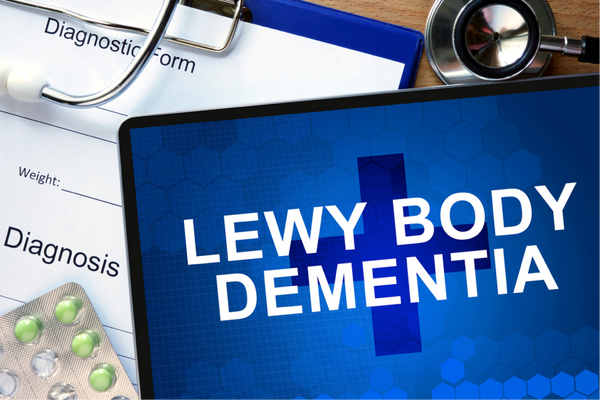Posted on

Each one of us has experienced what it is like to feel “sick.” The winter season rolls around and people tend to experience having a “cold” or the “flu” more often than they did during the warm summer months, but many people, unfortunately, suffer from more severe and fatal diseases, that are much bigger than a simple sore throat or a cough. One of those severe diseases is Lewy body dementia (LBD).
What it means to be diagnosed with Lewy Body Dementia:
Friederich H. Lewy discovered abnormal protein deposits, which disturb the brain's ability to function normally, while he was researching Parkinson’s disease in the early 1900s. Lewy body proteins diminish the neurotransmitter dopamine, which causes the body to exude symptoms that are very similar to Parkinson’s disease.
These proteins are located in the brain stem and the cerebral cortex and deplete the chemical acetylcholine, which interferes with perception, behavior, and the ability to think clearly. Many people suffer from Lewy body dementia in its pure form, but it is also found in conjunction with Parkinson’s disease and Alzheimer’s disease.
An estimated 1.5 million people are affected by LBD in the United States and because the symptoms resemble other diseases, many medical professionals still are unfamiliar with it, making it a widely underdiagnosed disease.
Symptoms explained:
- Fluctuations in cognition - This will most likely be noticed by those who are close to the person with LBD, such as friends, family, and coworkers. Often they may show episodes of confusion, which can last for hours or even days. Unlike the well-known “sundowning” of Alzheimer’s, which is when a person will become more confused late in the day, those with LBD may show symptoms of confusion at any time.
- Hallucinations - Most of the time the hallucinations will be visual and occur when someone is most confused, but they manifest in taste, sound, smell, and touch.
- Parkinsonism - Symptoms will be similar to those found in Parkinson’s, body stiffness, a shuffling walk, tremors, and drooling.
- REM Sleep Behavior Disorder (RBD) - This is a common first sign of Lewy Body Dementia. A person may speak, gesture, and move during periods of REM sleep. There is often a time of confusion between dreaming and waking up. Studies have shown that two-thirds of people who are diagnosed with RBD will develop degenerative brain diseases, such as LBD, Parkinson’s, and multiple system atrophy.
- Sensitivity to neuroleptic drugs - Neuroleptic Malignancy Syndrome, which is a life-threatening disease, has been reported in those suffering from Lewy Body Dementia, and causes certain medications to have an effect on cognition and the severity of hallucinations.
- Autonomic dysfunction - Including difficulty swallowing, dry eyes/mouth, constipation, urinary problems, blood pressure fluctuations, heart rate variability, hyperhidrosis, and syncope (fainting).
- Visuospatial problems - Including sense of direction, illusions, object orientation, and depth perception.
- Psychiatric disturbances - Including aggression, depression, and systematized delusions.
How to help someone suffering with Lewy Body Dementia:
Educate others about LBD
Most people are unfamiliar with LBD, including those in the medical field, but caregivers can educate others by:
- Alerting emergency room physicians and staff about the extreme sensitivity to antipsychotic medications in LBD patients. This way they can contact their primary care physician before they administer any medication.
- Teach friends and family about symptoms, so they can better understand the situation.
Adjust Expectations
When caring for someone with dementia of any kind there will be times of frustration, anger, impatience, fatigue, and resentment. Know your strengths, weaknesses, and limitations and have a plan of action when these emotions arise. By adjusting expectations, you not only help them, but it will be better for your own health and well-being.
Use your resources
There are dementia specific products out there that can help someone suffering from LBD with day to day activities, such as:
- Dementia clocks - Placing easy-to-read clocks around the home can help ease anxiety and aid with confusion. Confusion can cause someone to lose track of simple daily things, so when common questions, such as “what time is it?” come up, a dementia clock can be there to answer the question. This is both beneficial for those struggling with dementia and for caregivers.
- Lockable pill dispenser with phone and internet connection - Pill dispensers with locks keep loved ones who suffer from dementia from taking extra medication due to confusion, but it also allows caregivers to connect to a device, such as a phone and receive alerts whenever a dose is missed.
- Decal label kit - Even within their own home, confusion may make it increasingly difficult to remember where things are located. With removable decals, including names and pictures, you can label rooms within the house, drawers, and closets.
Lewy Body Dementia can be a frightening thing for those suffering from it and for family and friends who become caregivers, but by planning ahead, adjusting future expectations, and creating an environment that can aid with difficulties, it can be less intimidating and manageable.


0 comments